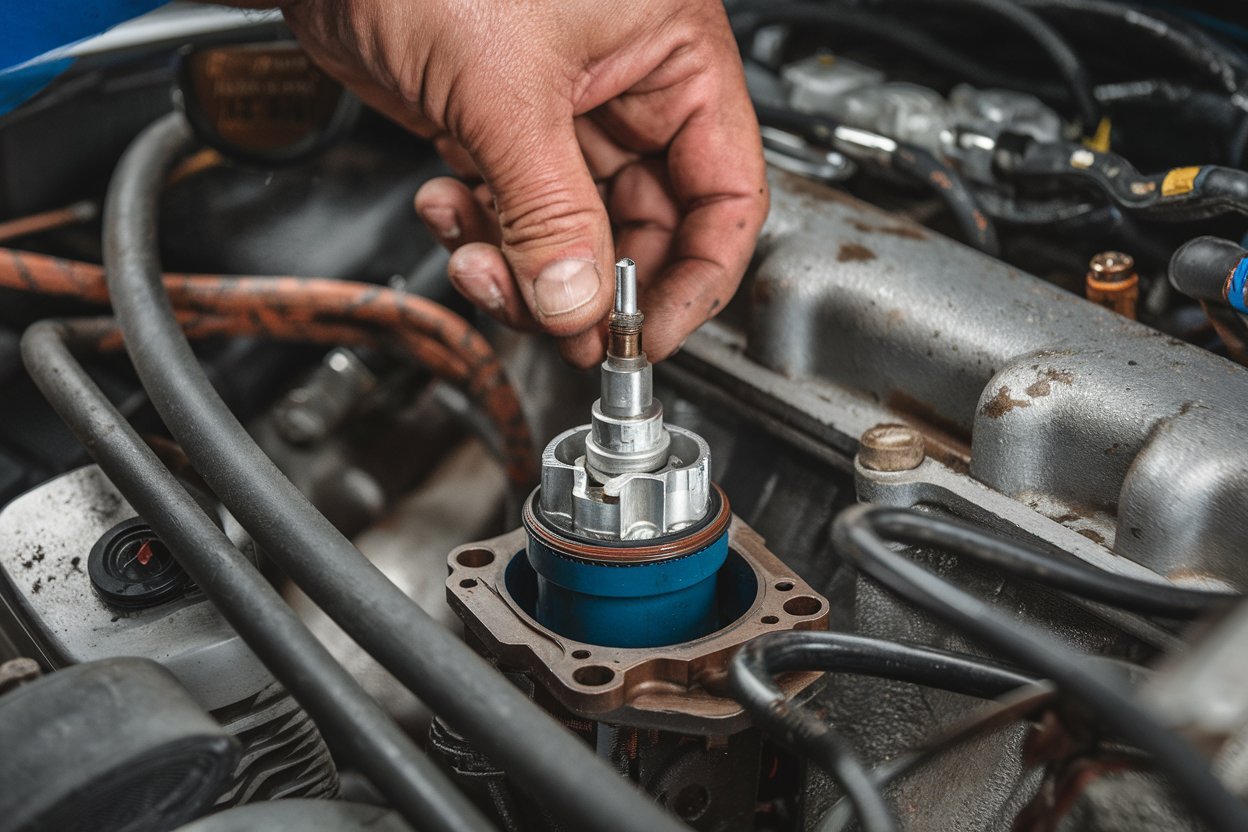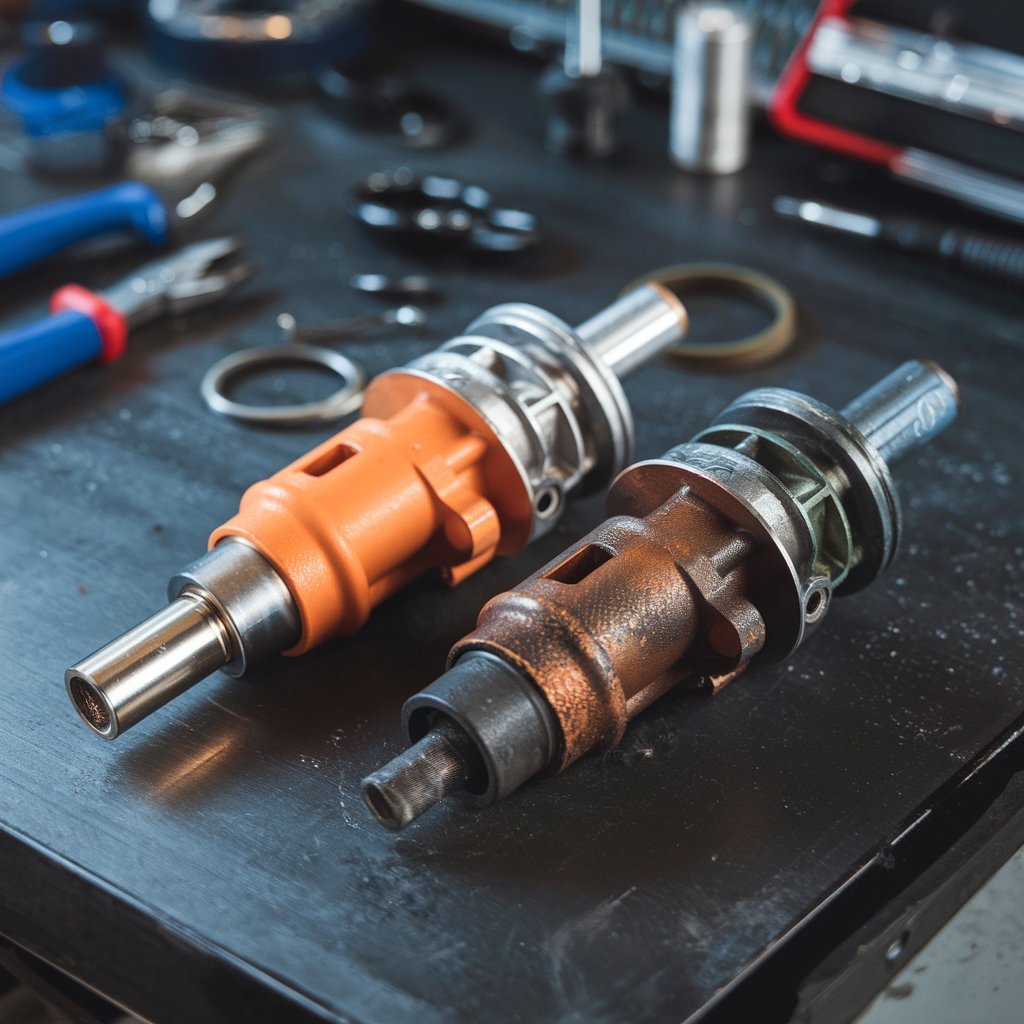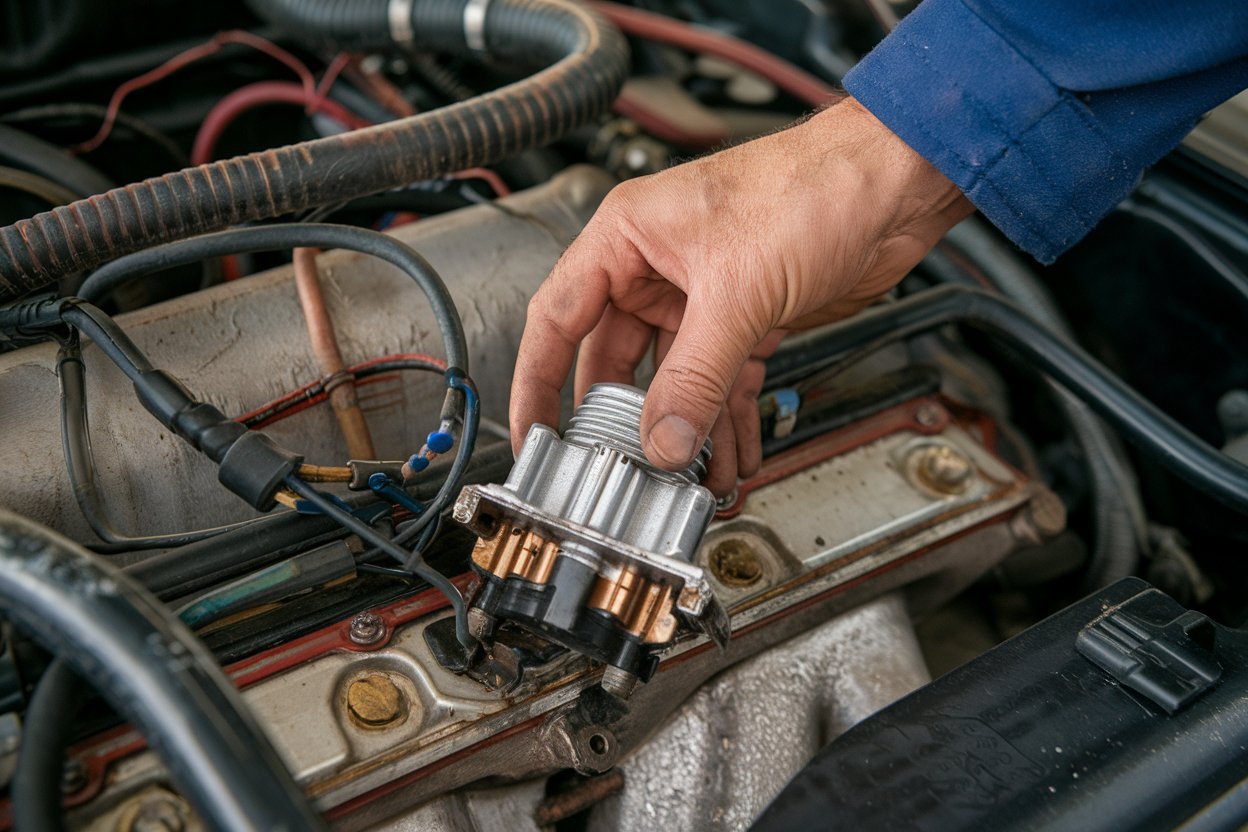Is your Volkswagen Golf experiencing rough idling, poor fuel efficiency, or engine misfires? These are clear signs of faulty fuel injectors, a common issue in Volkswagen Golf TSI, TFSI, and TDI engines. Over time, Golf injectors can clog due to carbon buildup, fuel contamination, or electrical malfunctions, leading to decreased performance and increased fuel consumption. At our Volkswagen Repair workshop in Dubai, we offer professional Volkswagen Golf injector replacement using genuine OEM parts to restore optimal fuel delivery and engine efficiency. Our advanced diagnostic tools, precision installation, and ECU coding ensure a seamless injector upgrade for your Golf. Book your service today and get an exclusive 15% discount on Volkswagen fuel injector replacement in Dubai!

A fuel injector is a crucial component in the Volkswagen Golf fuel system, responsible for delivering the precise amount of fuel into the combustion chamber at the right time. Unlike older carburetor systems, fuel injectors use high-pressure electronic control to spray atomized fuel directly into the engine, ensuring efficient air-fuel mixture and combustion.
A bad fuel injector can cause serious problems in your Volkswagen Golf, affecting engine performance, fuel economy, and drivability. Here are six specific signs that show your fuel injectors may need replacement:
A clogged or faulty injector can stop fuel from reaching one or more cylinders. This makes the engine run unevenly, causing noticeable shaking or vibrations when the car is idle.
If an injector leaks or delivers too little fuel, the engine may stall unexpectedly, especially at low speeds or while stopping. You might also notice the car hesitating or feeling weak when pressing the accelerator.
In turbocharged Golf models like the GTI or R, fuel injectors must deliver the right amount of fuel at the right time. A dirty or slow injector can cause delayed turbo boost, making the car feel sluggish when accelerating.
A failing injector often triggers the Check Engine Light (CEL). If a scan shows codes P0201 to P0204, this means the ECU has detected a problem in the injector circuit, which could be a faulty injector, wiring issue, or fuel delivery problem.
If an injector leaks fuel overnight, the engine may struggle to start in the morning because too much fuel is in the system. You might also smell strong fuel odors from the exhaust when starting the car.
If an injector sprays too much or too little fuel, the air-fuel mixture inside the engine gets unbalanced. This can cause knocking sounds, pinging, or unusual clicking noises from the engine, especially when accelerating or under load.

Fuel injectors directly affect engine performance, fuel economy, and emissions control. A properly functioning injector ensures:
Ignoring fuel injector maintenance can lead to engine misfires, rough idling, poor mileage, and costly repairs. If you notice performance issues in your Volkswagen Golf, a professional injector inspection and replacement service is recommended.
Modern Volkswagen Golf TSI, TFSI, and TDI engines require precise fuel injector coding and ECU calibration after replacing injectors. Unlike older models, where injectors worked independently, newer VW Golf fuel injection systems depend on the Engine Control Unit (ECU) to regulate fuel spray timing, pressure, and atomization.
✔ Accurate Fuel Injection Timing – Prevents engine misfires and rough idling.
✔ Balanced Fuel-Air Mixture – Ensures smooth performance and better mileage.
✔ Reduced Engine Vibrations & Noise – Eliminates knocking and hesitation.
✔ Lower Fuel Consumption & Emissions – Optimized fuel burn reduces CO₂ and NOx.
🚨 Check Engine Light (Fault Codes P0263-P0266)
🚨 Unstable Fuel Delivery Causing Power Loss & Rough Idling
🚨 Higher Fuel Consumption Due to Incorrect Injection Pulse
🚨 Slow Acceleration & Turbo Lag in GTI & R Models
🔧 Run a Full Diagnostic Scan with Volkswagen VCDS & ODIS Software
🔧 Input New Injector Calibration Codes into the ECU
🔧 Adapt Fuel Injection Timing for Optimal Engine Performance
🔧 Test Drive & ECU Re-Check to Ensure Smooth Operation
If you’re replacing Volkswagen Golf fuel injectors, skipping coding and calibration can cause serious performance issues. At our Volkswagen Repair Dubai workshop, we offer professional Golf injector programming services to keep your Golf R running at peak efficiency.
Fuel injectors in a Volkswagen Golf TSI, TFSI, GTI, R, or TDI are built for precise fuel delivery, but they can fail due to wear, contamination, or electrical issues. A damaged Golf injector affects engine performance, fuel economy, and drivability, leading to misfires, rough idling, and power loss. Below are four specific reasons why Golf fuel injectors fail in Volkswagen Golf models:
Direct injection systems in Volkswagen Golf TSI and TFSI engines cause carbon deposits to accumulate on the injector tips over time. This buildup restricts fuel flow, resulting in poor combustion, engine misfires, and rough idling.
Turbocharged Golf GTI & R models operate under high fuel pressure (up to 2,500 bar). Over time, injector seals crack or harden, causing fuel leaks, unstable air-fuel mixture, and performance issues.
Volkswagen Golf TDI diesel injectors rely on fuel for lubrication. Using low-quality diesel reduces lubrication, leading to excessive injector wear, hard starts, increased emissions, and power loss.
Injectors rely on ECU-controlled electrical pulses. Faulty wiring, corroded connectors, or a damaged solenoid can cause irregular fuel injection, triggering Check Engine Light codes (P0201-P0204), misfires, and reduced fuel efficiency.
Understanding the costs associated with Volkswagen Golf fuel injector replacement in Dubai is essential for effective budgeting and maintenance planning. Below is a breakdown of estimated expenses:
Please note that these figures are approximate and can vary based on factors such as the specific model of your Volkswagen Golf, the year of manufacture, and the current condition of your vehicle. For a precise quote tailored to your car’s needs, we recommend contact us today.

A damaged or clogged fuel injector can cause engine misfires, poor acceleration, and excessive fuel consumption in your Volkswagen Golf GTI, R, TSI, or TDI. At our Volkswagen Repair Dubai workshop, we follow a detailed 6-step process to ensure accurate diagnosis, replacement, and ECU calibration. Our expert Volkswagen specialists use genuine OEM Golf injectors and advanced diagnostic tools to restore your car’s performance and fuel efficiency.
We scan the engine using Volkswagen VCDS & ODIS software to detect fuel injector faults. Our technicians inspect fuel pressure, injector spray patterns, and response rates while checking for error codes (P0201-P0204, P0263-P0266) that indicate injector circuit failures.
The fuel system is depressurized to prevent leaks, and we disconnect the fuel rail, electrical connectors, and high-pressure fuel lines. Our team inspects seals, O-rings, and fuel lines for wear and contamination before proceeding with removal.
We carefully extract the old injectors without damaging the fuel rail or intake manifold. The Golf injector ports are thoroughly cleaned to remove carbon deposits and fuel residue, ensuring a proper seal for the new injectors.
We install genuine OEM Volkswagen fuel injectors to maintain factory performance and longevity. New O-rings and injector seals are replaced to prevent fuel leaks, and all fuel rail connections and wiring harnesses are securely reattached.
Each new fuel injector is programmed into the ECU using Volkswagen ODIS software. We adjust the fuel injection timing, spray pressure, and adaptive learning settings to ensure a smooth idle, balanced fuel mixture, and optimal engine performance.
A fuel pressure test is conducted to confirm there are no leaks or irregularities. We perform an engine idle and acceleration test to ensure smooth operation and take the car for a test drive to verify fuel efficiency, turbo response, and overall drivability.
Trust our team of Expert Volkswagen Mechanics at our Volkswagen Service Center in Dubai for all your Volkswagen Repair and service needs.
Our Top-Notch Volkswagen Service Center in Dubai have the advanced diagnostic tools and Volkswagen experts to accurately identify and resolve any issues with your Volkswagen.
With over 1200+ Volkswagen repaired, our Volkswagen Service Center in Dubai is the trusted Garage for comprehensive and expert Volkswagen Repair services.
Most of the vehicles get damaged just because of maintenance neglect you take
Book a Call Back Now
If you’re experiencing fuel injector problems, visit our Volkswagen Repair Dubai center for a detailed inspection, professional injector replacement, and ECU calibration. Book your appointment today and get a 15% discount on injector replacement!
Driving with a damaged or leaking fuel injector is risky. A faulty injector can cause unburned fuel to enter the exhaust system, leading to catalytic converter failure, increased emissions, and even engine damage. In severe cases, a misfiring injector can cause knocking sounds and excessive heat buildup, which may result in piston or valve damage. If your Volkswagen Golf is showing injector-related issues, it’s best to schedule a replacement immediately.
The lifespan of Volkswagen Golf fuel injectors depends on driving habits and fuel quality. Generally, petrol injectors (TSI & TFSI models) last 100,000 – 150,000 km, while diesel injectors (TDI models) can last up to 200,000 km if properly maintained. Regular fuel system cleaning and using high-quality fuel can extend injector life. If you experience misfires, poor fuel economy, or rough idling, Golf injector replacement may be required earlier.
It depends on the condition of your injectors. If only one injector is failing, a single replacement may be enough. However, in high-mileage Volkswagen Golf models, injectors wear out at a similar rate, meaning if one fails, others may follow soon. To avoid future breakdowns and maintain balanced fuel delivery, replacing all injectors together is often recommended, especially for Volkswagen Golf GTI, R, and TDI engines.
Yes! In Volkswagen Golf turbocharged models (GTI & R), fuel injectors play a key role in delivering the right amount of fuel at high pressure. A clogged or leaking injector can cause an imbalanced air-fuel mixture, leading to turbo lag, excessive exhaust smoke, and potential turbocharger failure. If you notice a loss of boost pressure, rough acceleration, or black smoke from the exhaust, it’s important to check both the injectors and turbo system.
“Talk to a Volkswagen Expert Now by booking a call, and get personalised solutions for your Volkswagen unique needs and requirements.”
+971564646081
